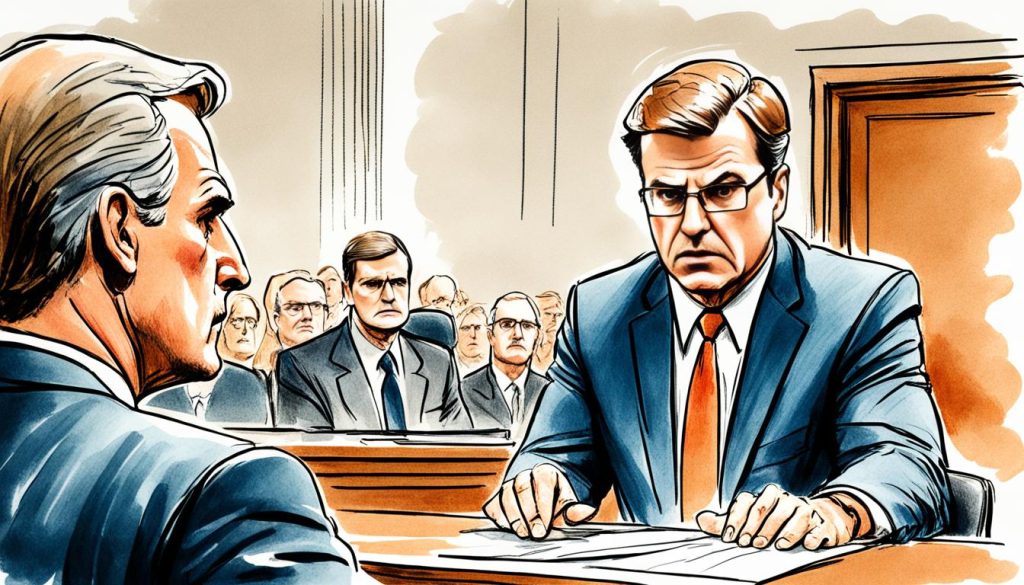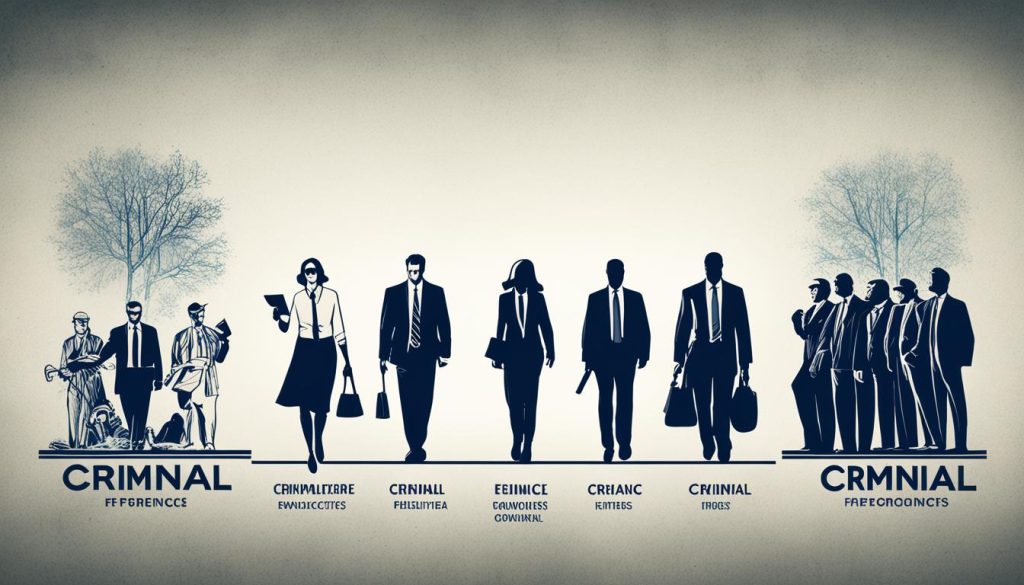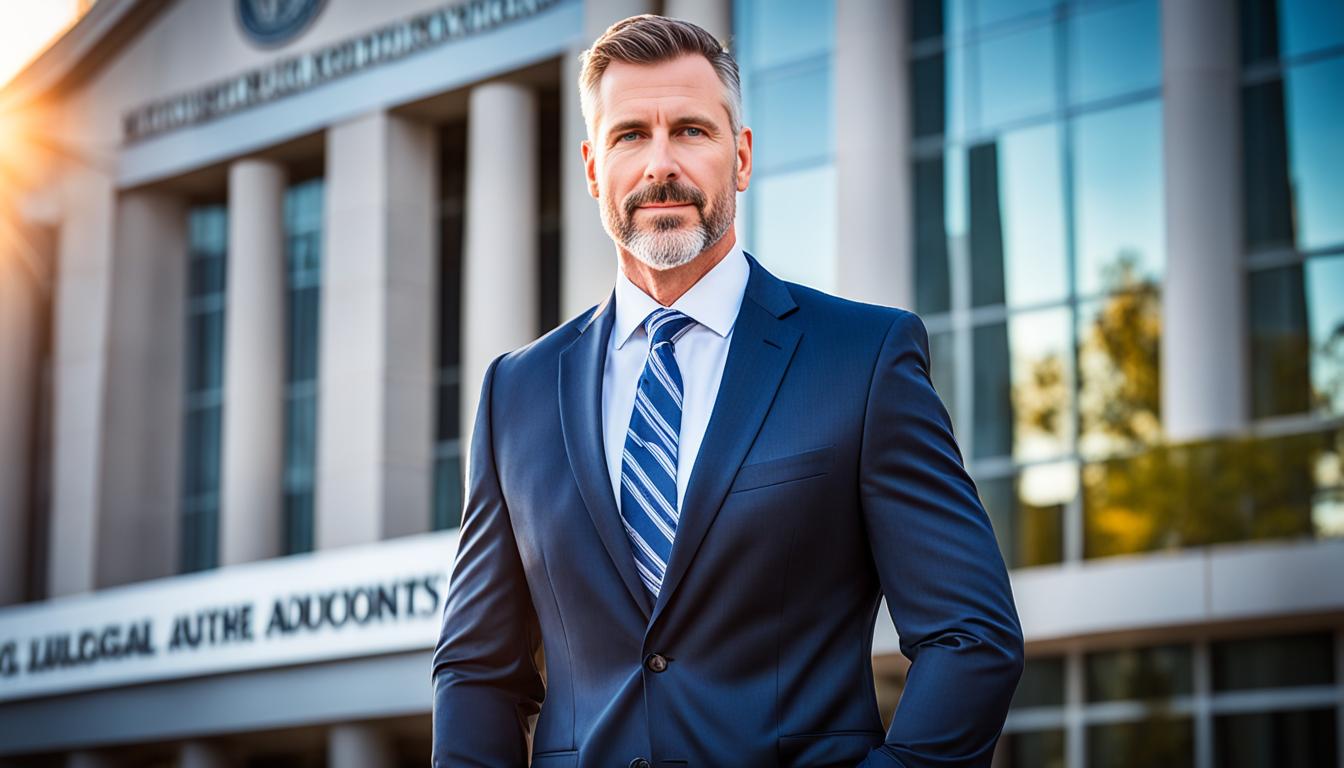If you’re facing criminal charges in Midland, Texas, finding the best legal defense is crucial for a favorable outcome. The expertise and skills of a premier defense attorney can make a significant difference in your case. In this article, we will explore the top-rated criminal lawyer in Midland and how they can provide the robust defense you need.
Key Takeaways
- Choosing the best criminal defense attorney is essential for your case in Midland, Texas.
- A top-rated lawyer can offer the expertise and skills necessary for a robust defense.
- Consider factors like experience, reputation, and specialization when selecting an attorney.
- Research online reviews and testimonials to gauge the quality of legal services offered.
- Consultation with the attorney is key to assessing their compatibility and understanding their approach to your case.
The Rise of LawyerLori: From Courtroom Stories to True Crime Analysis
Lori Murray, also known as “LawyerLori” on TikTok, has become a sensation on the platform, captivating audiences with her engaging and informative content. Murray initially started by sharing intriguing stories from the courtroom, offering a unique glimpse into the legal world. As her following grew, she expanded her content to include true crime analysis, delving into high-profile trials like those of Kyle Rittenhouse and Alex Murdaugh.
Murray’s true crime analysis videos quickly gained traction, attracting thousands of views and sparking conversations among true crime enthusiasts. Her in-depth analysis, coupled with her expertise as a criminal defense attorney, has made her a sought-after voice on TikTok.
Through her TikTok platform, LawyerLori has managed to bridge the gap between entertainment and education, captivating audiences with her unique blend of storytelling and legal insight.
With her growing popularity as a TikTok sensation and popular content creator, LawyerLori has established herself as a trusted source for true crime analysis. Her ability to break down complex legal cases and present them in an accessible manner has garnered praise from both legal professionals and TikTok users.
“LawyerLori’s true crime analysis videos provide valuable insight into the legal aspects of high-profile cases. Her expertise as a criminal defense attorney makes her analysis both informative and engaging.”
In addition to her true crime analysis, LawyerLori continues to share stories from the courtroom and provide legal advice, creating a well-rounded content experience for her followers. She has successfully leveraged the power of TikTok to educate and entertain, making the law more accessible to a wider audience.
As LawyerLori’s influence continues to grow, her impact on the true crime community and the legal sphere is undeniable. Through her TikTok platform, she has created a space for discussion, analysis, and education, solidifying her position as a prominent figure in the world of true crime analysis.
Ethical Dilemmas: Discrediting Truthful Witnesses in Criminal Defense
A key ethical dilemma faced by criminal defense attorneys is whether they can ethically discredit a truthful witness during cross-examination and closing arguments. The use of various techniques to cast doubt on the testimony of a credible witness has been a subject of scholarly discussion. While it is ethically permissible to challenge the credibility of a witness, some defense attorneys resort to unethical means to achieve this, raising concerns about the current ethics rules and the need for cultural change in the field.
“The duty of a criminal defense attorney is to vigorously advocate for their client. However, this duty should not extend to discrediting witnesses without ethical limits. We must carefully navigate the line between zealous advocacy and ethical conduct.”
– Jennifer Thompson, Legal Scholar
The Importance of Ethical Limits
In criminal defense, attorneys are tasked with building a strong defense for their clients. This often entails challenging the credibility of witnesses presented by the prosecution. However, it is essential that defense attorneys operate within ethical limits to ensure fairness in the pursuit of justice.
One of the primary reasons for ethical limits is the preservation of the justice system’s integrity. Discrediting truthful witnesses without valid grounds undermines the trust in the legal process and may impede the pursuit of truth. It is crucial for criminal defense attorneys to balance their duty to vigorously advocate for their clients with the ethical responsibility to uphold the justice system’s core values.
The Role of Cultural Change in the Field
The use of unethical techniques to discredit witnesses often stems from cultural norms within the criminal defense field. The perception that achieving a favorable outcome justifies any means can incentivize defense attorneys to cross ethical boundaries. To address this issue, cultural change is necessary.
Cultivating a culture of ethical conduct requires a collective effort from legal professionals, professional organizations, and educational institutions. Emphasizing the importance of ethical responsibilities during legal education and fostering a sense of accountability within the legal community can help combat the prevalence of unethical practices.

Modernizing Ethics Rules
The existing ethics rules provide a framework for attorneys to navigate ethical dilemmas, but they may require refinement to address the specific challenges faced in discrediting truthful witnesses. Modernizing ethics rules can set clearer guidelines on the acceptable boundaries when challenging a witness’s credibility.
Additionally, implementing stricter consequences for attorneys who engage in unethical behavior can serve as a deterrent and discourage the use of these techniques. The legal profession must continually evaluate and update its ethics rules to adapt to evolving ethical challenges in the field.
Techniques for Discrediting Truthful Witnesses: Cross-Examinations and Closing Arguments
Criminal defense attorneys employ various methods to discredit witnesses, whether they are telling the truth or not. These techniques can be categorized into two groups: ethical and unethical approaches. In cross-examinations, attorneys strategically use strategies to challenge a witness’s credibility and cast doubt on their testimony. These cross-examination strategies include eliciting true facts that contradict the witness’s story, highlighting inconsistencies in their statements, or presenting false stories to challenge their narrative.
Furthermore, defense attorneys utilize closing arguments as an opportunity to reinforce their case and discredit witnesses. They may introduce false implications, exaggerate inconsistencies in the testimony, or weave together a persuasive narrative that contradicts the witness’s version of events.
It is important to note that while some of these techniques are considered ethically permissible, others cross ethical boundaries. The ethical status of each technique depends on the specific circumstances and the professional judgment of the attorney. The application of current ethics rules plays a critical role in guiding the ethical boundaries of these discrediting techniques.

Addressing Unethical Behavior and the Need for Cultural Change
Unethical behavior in discrediting truthful witnesses persists, often due to the lack of consequences and cultural norms in the criminal defense field. Despite efforts to reform ethical rules, their effectiveness in preventing unethical behavior is limited. The importance of narrative structure, explicit statements of innocence, and the culture of criminal defense work contribute to the persistence of unethical techniques. To curb such behavior, a cultural change in the field is needed, alongside increased compliance with ethical guidelines.
The Impact of Unethical Behavior
Unethical behavior in criminal defense, such as discrediting truthful witnesses, undermines the justice system’s integrity. It not only affects the credibility of the defense profession but also erodes public trust in the legal system as a whole. When defense attorneys employ unethical techniques to cast doubt on credible witnesses, it jeopardizes the pursuit of truth and fairness in courtrooms.
The lack of consequences for unethical behavior exacerbates the issue. Without sufficient penalties or disciplinary measures, defense attorneys may continue to engage in unethical practices, prioritizing winning over upholding ethical standards. This perpetuates a culture where unethical behavior becomes normalized, further hindering the necessary change.
The Role of Ethical Rules and Cultural Norms
Efforts to reform ethical rules in the legal profession have been made to address unethical behavior. However, these rules face challenges in effectively deterring and preventing misconduct. Compliance with ethical rules alone is not enough to instigate lasting change.
The culture of criminal defense work plays a significant role in sustaining unethical practices. The narrative structure often employed by defense attorneys, which focuses on raising doubts rather than seeking truth, can contribute to the perpetuation of unethical behavior. Additionally, the emphasis on creating explicit statements of innocence can incentivize defense attorneys to use any means necessary, including unethical tactics, to undermine witnesses and bolster their clients’ defense.
Promoting Cultural Change and Ethical Compliance
To address unethical behavior and foster a healthier legal environment, cultural change within the criminal defense field is imperative. This involves a shift in attitudes and practices, supported by increased compliance with ethical guidelines.
Educational initiatives that emphasize the importance of ethical conduct in criminal defense can help create a culture that values integrity and fairness. By promoting discussions on the impact of unethical behavior and raising awareness of alternative strategies, such as rigorous cross-examination techniques within ethical limits, the legal profession can begin to reinforce positive cultural norms.
Furthermore, strict enforcement of ethical rules and accountability for unethical conduct are crucial. By imposing appropriate penalties and holding defense attorneys accountable for their actions, the legal system can send a clear message that unethical behavior will not be tolerated.

Through a combination of cultural change, ethical compliance, and educational initiatives, the criminal defense field can evolve to ensure that ethical standards are upheld and the pursuit of justice remains uncompromised. By addressing unethical behavior, we can strengthen public trust in the legal system and promote a fair and just society.
Conclusion
When facing legal charges, it is essential to find a criminal defense attorney in Midland TX who can provide a robust and tailored legal defense for your specific case. One standout attorney who exemplifies both expertise and passion is Lori Murray, known for her TikTok fame and popular legal commentary.
While ethical dilemmas can arise in discrediting truthful witnesses, Murray’s platform showcases the value of legal education for both lawyers and non-lawyers. Through her entertaining and informative videos, she not only engages her audience but also sheds light on important aspects of criminal defense.
By using her online voice for both entertainment and good, Lori Murray sets an example of what it means to be a top-rated criminal defense attorney. Her dedication to the field and commitment to providing tailored legal defense make her the ideal choice for individuals in need of expert representation in Midland TX.
FAQ
How do I find the best criminal defense attorney in Midland TX?
What makes a criminal defense attorney premier in Midland Texas?
How can I find the top-rated criminal lawyer in Midland?
Why should I choose a premier defense attorney in Midland Texas?
What qualities should I look for in the best criminal attorney in Midland?
How can a top Midland TX criminal defense law firm assist me?
Source Links
- http://www.grainlandcooperative.com/markets/stocks.php?article=abnewswire-2023-8-21-criminal-lawyer-russ-kofman-discusses-new-york-criminal-defense-laws-in-newly-released-article
- https://www.thestate.com/news/politics-government/article280727625.html
- https://scholarship.law.marquette.edu/cgi/viewcontent.cgi?article=5276&context=mulr




No comments! Be the first commenter?